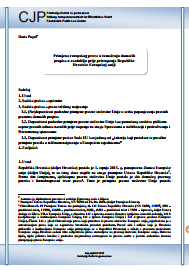Primjena europskog prava u tumačenju domaćih propisa u razdoblju prije pristupanja Republike Hrvatske Europskoj uniji
The application of European law in the interpretation of domestic regulations in the period prior to the accession of the Republic of Croatia to the European Union
Author(s): Daria Pugel
Subject(s): Law, Constitution, Jurisprudence, Constitutional Law, Public Law, EU-Approach / EU-Accession / EU-Development, EU-Legislation
Published by: Fondacija Centar za javno pravo
Keywords: Public law; constitution; Constitutional Court; EU legislation; EU accession; Republic of Croatia;
Summary/Abstract: Although the European Union’s acquis communitaire was not an integral part of the national legal system and legislation in the period before Croatia’s accession to the EU, EU law still played a significant role in Croatian national legislation, both in creation of new laws and modification of existing ones, as well as in interpretation of ambiguous, vague or undetermined provisions of national laws and bylaws, especially in competition law cases. The grounds for such influence of EU law on national legislation was found in the Stabilisation and Association Agreement (hereinafter: SAA), an international treaty signed between the Republic of Croatia, European Communities and their Member States on October 29th 2001, which provided that Republic of Croatia shall endeavour to ensure that its existing laws and future legislation will be gradually made compatible with the acquis communitaire, and that national competent administrative bodies and courts, when assessing whether certain agreements and practices of undertakings or state itself are contrary to SAA’s principles regarding the protection of the free market, shall resort to criteria arising from the application of the competition rules applicable in the Community, in particular from Articles 81, 82, 86 and 87 of the Treaty establishing the European Community and interpretative instruments adopted by the Community institutions. Relying on such provision of the SAA, the competent administrative body in Croatia and Administrative Court of the Republic of Croatia, in several competition law cases relied on EU law as a supplementary instrument for the interpretation of national legislation, in those situations where national law contained certain ambiguities or legal voids, or in situations where national legislation failed to regulate certain matters. The validity of such practice was disputed by unsatisfied parties, and consequently, the matter was brought before the Constitutional Court of Republic of Croatia, which in its decision dock.no. U-III-1410/2007 of February 13th 2008 adopted a standpoint that competent administrative bodies and courts, when assessing whether there has been a violation of free market in a certain case, are not only authorised but obliged to consult criteria and interpretative instruments adopted by the Community institutions, even when agreements and practices of undertakings in question pertain to the time period before the SAA came into force. However, the Constitutional Court of the Republic of Croatia emphasised that EU law should not be used as a formal and primary source of law in Republic of Croatia, but as a strong and important instrument for interpretation of national legislation or for filling its legal voids, but only to the extent that such interpretation is in the spirit of national legislation and is not in contradiction with its explicit provisions.
Series: Fondacija Centar za javno pravo - Analize
- Page Count: 17
- Publication Year: 2015
- Language: Croatian
- Content File-PDF
- Introduction

